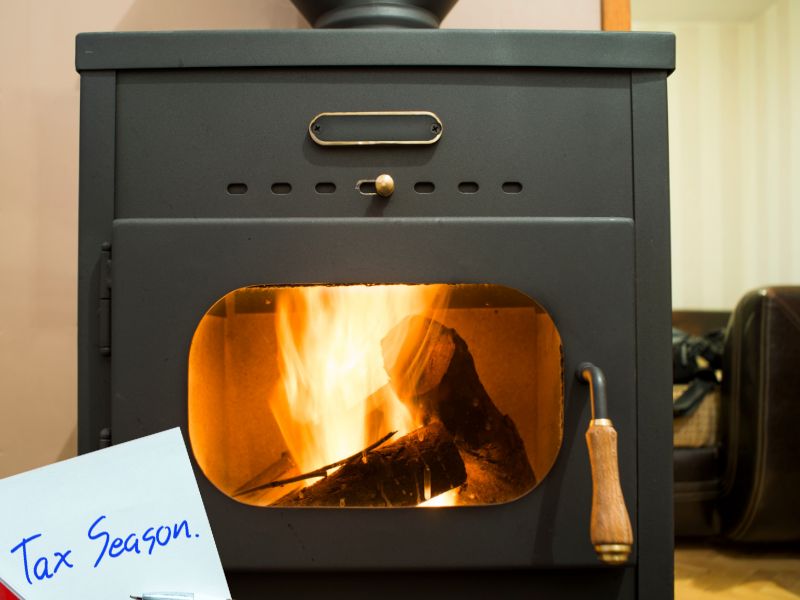As winter approaches, many homeowners turn to heating options beyond their conventional systems, such as wood stoves. While choosing this option can be eco-friendly and cost-effective, one may wonder if they can also benefit from tax write-offs.
The answer, as with many tax-related questions, is not straightforward. In this article, we will explore the possibilities and limitations of claiming a wood stove as a tax deduction.
Tabe of Contents
- Understanding Tax Write-Offs for Home Improvements
- Are Wood Stoves Eligible for Tax Write-Offs? Here’s What You Need to Know
- How to Determine the Tax Deductibility of Your Wood Stove Installation Expenses
- Maximizing Tax Benefits: Tips & Strategies for Claiming Wood Stove Write-Offs
- 3 Common Mistakes to Avoid When Claiming Wood Stove Expenses on Your Taxes
- People Also Ask
- Conclusion
Understanding Tax Write-Offs for Home Improvements
Tax write-offs can be a great way for homeowners to save some money while improving their homes. But not all home improvements are eligible for tax deductions. To take advantage of these benefits, it’s important to understand what types of expenses you can write off on your taxes.
When it comes to home improvements, the Internal Revenue Service (IRS) allows you to deduct certain expenses. However, the criteria for eligibility can be complex and vary depending on several factors, including the type of improvement, the value added to the home, and whether or not the property is a rental or primary residence.
In general, home improvements that increase the value of your property, prolong its life, or adapt it for new uses are usually eligible for tax write-offs. These include upgrades to your HVAC system, insulation, and solar panels, among others. But can you write off a wood stove on your taxes? Let’s find out.
Are Wood Stoves Eligible for Tax Write-Offs? Here’s What You Need to Know
If you are planning to install a wood stove in your home, you may be wondering if you can write off the cost on your taxes. The answer is yes, under certain conditions. However, not all wood stove expenses are eligible for tax deductions, and the rules can be complex.
Here’s what you need to know…
What Is a Tax Write-Off?
A tax write-off, also known as a tax deduction, is an expense that the IRS allows you to subtract from your taxable income. By claiming tax write-offs, you can lower your tax bill and potentially save money. However, not all expenses are eligible for write-offs, and the amount you can deduct can vary depending on various factors, such as your income, filing status, and the type of expense.
Which Wood Stove Expenses Are Eligible for Tax Write-Offs?
Typically, you can claim a tax write-off for the installation costs of a wood stove if it is used as a primary source of heating for your home. The IRS considers a wood stove as a qualified energy-efficient improvement if it meets certain efficiency standards and is installed in your main home in the United States.
You may be able to deduct the full cost of the wood stove installation, including the cost of the stove, chimney, and related labor expenses. However, there are some caveats.
For example, you can only claim the write-off for the portion of expenses that exceed any available utility or tax credits. Additionally, you must have proof of purchase and installation, as well as a certification statement from the manufacturer showing the stove meets the energy-efficiency requirements.
Which Wood Stove Expenses Are Not Eligible for Tax Write-Offs?
On the other hand, not all wood stove expenses are eligible for tax write-offs. For example, you cannot claim a write-off for a wood stove installed in a vacation home or as a backup heating source. Additionally, expenses for routine maintenance or repairs are not eligible for write-offs.
It’s also important to note that tax laws may change, and the eligibility requirements for wood stove write-offs may vary by state or locality. Therefore, it’s always a good idea to consult a tax professional to determine if you qualify for a wood stove tax write-off, and how much you can deduct.
How to Determine the Tax Deductibility of Your Wood Stove Installation Expenses
As a homeowner, you may be wondering if the expenses you incur when installing a wood stove in your home are eligible for a tax write-off.
The answer to this question isn’t straightforward, but the good news is that you might be able to claim some of these costs on your taxes. Here’s what you need to know.
Understanding the Different Types of Home Improvements
According to the Internal Revenue Service (IRS), not all home improvements are eligible for tax write-offs. To claim a deduction, the IRS requires that your expenses fall under one of two categories: maintenance or improvements.
Maintenance expenses are those that keep your home in good condition, such as repairing a leaky roof or fixing a broken window. On the other hand, improvements are expenses that add value to your home, such as installing a new HVAC system or a wood stove.
Knowing When to Claim a Tax Deduction
If you’ve installed a wood stove to improve your home’s heating efficiency, you may be able to claim a deduction for your expenses. However, there are a few things to keep in mind before you do so. First, you’ll need to itemize your deductions when filing your taxes – meaning you’ll need to forgo the standard deduction.
Second, the amount you can claim as a deduction depends on the type of stove you’ve installed, as well as its energy efficiency rating.
It’s important to note that tax laws change frequently. To determine the deductibility of your wood stove installation expenses, consult with a tax professional or visit the IRS website for the most up-to-date information.
Eligibility Requirements
To claim a deduction for your wood stove installation expenses, the stove must meet certain eligibility requirements.
- First, it must be used primarily for heating your home.
- Second, it must be certified by the Environmental Protection Agency (EPA) as an energy-efficient appliance.
- Third, you’ll need to keep detailed records of your expenses to substantiate your claim. This includes receipts, invoices, and any other relevant documentation.
By following the guidelines above, you’ll be better equipped to determine the tax deductibility of your wood stove installation expenses.
While it may require additional paperwork and record-keeping, the potential tax savings may make it worth the effort.
Maximizing Tax Benefits: Tips & Strategies for Claiming Wood Stove Write-Offs
In order to maximize your tax benefits for a wood stove installation, it is important to keep track of all expenses related to the project. This includes not only the cost of the stove itself, but also any additional materials, installation fees, and related expenses.
One important strategy for claiming wood stove write-offs is to make sure that you are following all of the necessary tax guidelines and regulations. For example, the IRS has specific rules regarding which home improvements are eligible for tax deductions and how those deductions should be calculated.
Another key strategy is to work with an experienced tax professional who can help you navigate the complex world of tax write-offs and deductions. A tax specialist can help you identify all of the eligible expenses associated with your wood stove installation and ensure that you are claiming the maximum possible tax benefits.
In addition to working with a tax professional, there are several other steps you can take to ensure that you are maximizing your tax benefits.
These may include keeping detailed records of all expenses associated with the installation, checking for any available rebates or incentives, and exploring other potential tax deductions related to home energy efficiency improvements.
Overall, claiming a tax write-off for a wood stove installation can be a complex process, but with the right strategies and guidance, you can ensure that you are taking full advantage of all available tax benefits.
3 Common Mistakes to Avoid When Claiming Wood Stove Expenses on Your Taxes
It’s important to know that not all homeowners who install a wood stove are eligible for a tax write-off.
If you are eligible, it’s still crucial to file your claim correctly to avoid penalties and audits. Here are common mistakes you should avoid to ensure that your wood stove write-off is valid:
1. Claiming Personal Expenses as Business Expenses
One mistake that most homeowners make is claiming their wood stove expenses as a business expense. If you use your wood stove primarily for personal heating purposes, you cannot claim it as a business expense.
2. Forgetting to Collect Receipts and Documentations
You must keep receipts and documentations of all your wood stove installation expenses, including labor costs. These receipts and documents will serve as proof of your expense claims. Without them, you cannot claim a tax write-off when tax season comes around.
3. Ignoring Limits and Thresholds
Writing off wood stove expenses on your taxes have certain limits that you must adhere to. For instance, only expenses that exceed a certain amount can qualify for a deduction, known as a threshold.
Consequently, claiming more deductions than you’re eligible for will attract penalties and audits. It’s best to consult a tax professional to help you understand the limits and thresholds for wood stove write-offs.
In conclusion, suppose you’re planning to install a wood stove or have already installed one, it’s crucial to understand how to claim tax write-offs to avoid making mistakes that can land you in trouble with the IRS.
Always keep records of your expenses, understand limits and thresholds, and avoid claiming personal expenses as business expenses to minimize risk.
People Also Ask
What is a tax write-off?
A tax write-off, also known as a tax deduction, is an expense that you can subtract from your taxable income, which lowers your overall tax liability.
Is a wood stove tax deductible?
Yes, if you use the wood stove for heating your home, it may qualify for a tax credit or deduction under certain circumstances.
What is the energy tax credit?
The energy tax credit is a tax credit that provides a benefit to homeowners who make energy-saving improvements to their home, including the installation of qualified residential energy equipment such as wood stoves.
How much can I save on taxes with a wood stove?
The amount you can save on taxes with a wood stove varies depending on factors such as the cost of the stove, whether it meets energy-efficient guidelines, and your overall tax liability.
What documents do I need to claim a tax write-off for a wood stove?
When claiming a tax write-off for a wood stove, you may need to provide documentation such as receipts, invoices, and certification that the stove meets energy efficiency standards.
Conclusion
In summary, a wood stove may be eligible for a tax write-off if it is used for heating your home and meets certain energy efficiency guidelines.
To claim the tax write-off, you may need to provide documentation that the stove meets these requirements.
It’s always best to consult with a tax professional or accountant to ensure that you are taking advantage of all available tax deductions.

Emergency Services Coordinator
Oliver leads our round-the-clock emergency repair services. His swift response and problem-solving skills provide peace of mind during urgent AC breakdowns, making your comfort his priority.

